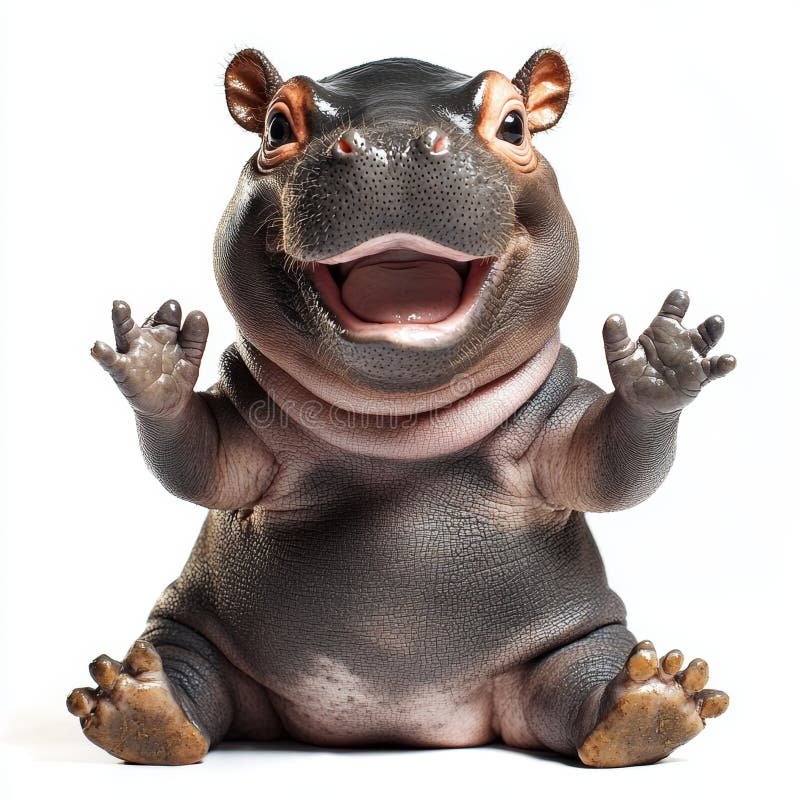
Let’s dive into the world of hippos and explore their surprising intellect. From their social behaviors to their problem-solving skills, we’ll take a closer look at how smart a hippopotamus really is. So, grab a drink and settle in as we embark on this fascinating journey into the minds of these giant, semi-aquatic mammals!
Social Intelligence: The Hippo Community
Hippopotamuses are social animals that often live in groups, called pods or bloats, consisting of around 10 to 30 members. These social structures play a crucial role in their intelligence, as living in such close quarters requires communication and cooperation. Here’s the thing: hippos use a series of vocalizations and body language to maintain their social bonds.
They communicate through grunts, groans, and even squeals—if you’ve ever heard a hippo, you know it sounds a bit like a mix between a cow and a very loud dog! Their vocalizations help establish hierarchy and signal alarm when danger lurks around. Honestly, it’s fascinating how their social lives resemble ours in some ways. Just like humans, they also show affection to one another and can form strong bonds.
Additionally, hippos are known to exhibit behaviors that indicate a level of empathy. For example, if a pod member is in distress, others often gather around to offer support. This suggests that hippos have a deeper understanding of the feelings of their companions than we might expect.
Problem-Solving Skills: Using Tools? Really?
You might not think of hippos as tool users, but some studies suggest they may have problem-solving skills that rival those of primates. For instance, researchers have observed hippos maneuvering objects in their environment to reach food, demonstrating a level of critical thinking.
When food becomes scarce, hippos have been known to use rocks or other large objects to help them access places that are otherwise unreachable. This adaptability showcases their intelligence and creativity. It’s like when you’re trying to grab that last cookie on a high shelf; sometimes, you need to get creative with how you reach it!
Interestingly, there’s also evidence that hippos can learn from their experiences. If they encounter a specific challenge, such as navigating through tricky terrain, they seem to remember that information for future reference. This ability to adapt and learn is a hallmark of cognitive intelligence.
Memory: Remembering Friend or Foe
Memory plays an essential role in the survival of hippos. They need to remember which areas are safe for foraging, which locations might be dangerous, and who their enemies are. Hippos are known to have excellent long-term memories and can recognize individual hippos even after years apart.
This ability becomes particularly important during territorial disputes. Hippos can remember past confrontations, which helps them avoid unnecessary fights. You might be wondering how exactly they do this. The answer lies in a combination of scent recognition and vocal communication—they can identify individuals through smell and sounds, making it easier to navigate their social circles.
In a world where survival often hinges on memory, hippos demonstrate that they have more than just a passing recollection of their surroundings. They actively use their memories to enhance their social interactions and manage threats.
Emotional Intelligence: Feelings Matter
Hippopotamuses might not wear their hearts on their sleeves, but they certainly experience a range of emotions. Observational studies have shown that hippos display behaviors indicative of joy, affection, and even anger. When a hippo plays with its young, you can see it exhibit signs of happiness, such as splashing around and vocalizing in excitement.
They also have protective instincts, especially when it comes to their young. A mother hippo will fiercely defend her calf from attackers—much like a lioness would. This protective behavior shows a level of emotional intelligence, as mothers understand the importance of keeping their offspring safe and healthy.
Moreover, hippos can also demonstrate stress and depression. When separated from their pod, they may show signs of distress, which indicates they have an understanding of social bonds that’s crucial for their well-being.
Physical Adaptations: The Body’s Role in Intelligence
Hippos have physical features that significantly contribute to their survival and cognitive abilities. For instance, their large mouths and powerful jaws allow them to defend themselves and communicate effectively. Let me explain: the unique shape of a hippo’s mouth creates a wide range of vocalizations, helping them establish social hierarchy or warn others of potential threats.
Another fascinating adaptation is their ability to see clearly underwater. Hippos’ eyes, ears, and nostrils are positioned high on their heads, allowing them to remain submerged while still being aware of their surroundings. This adaptation is critical for both hunting and avoiding danger, as they can spot threats and communicate with members of their pod while mostly underwater.
These physical traits not only aid their survival but also support their cognitive abilities. When you’re equipped with the right tools, it’s easier to navigate challenges—hippos are no exception to this!
The Role of Play: Learning through Fun
Play is often overlooked as a valuable tool for learning, but for hippos, it’s essential. Young hippos engage in playful behaviors, like chasing each other around in the water or rolling about on land. These activities are not just fun; they help them practice important social skills and learn about their environment.
Through play, younger hippos develop motor skills and establish social bonds, much like human children do. When you see a calf rolling in the mud with a friend, they are not just having a good time; they are building confidence and learning how to interact with others. This playful nature contributes to their overall intelligence, as it encourages exploration and social growth.
Moreover, adult hippos also engage in play, which suggests that their learning doesn’t stop once they reach maturity. This kind of playful behavior is often a sign of intelligence, as it indicates they’re capable of more complex social interactions.
So, just how smart is a hippopotamus? From their social intelligence and problem-solving skills to their impressive memory and emotional understanding, hippos are much more than just oversized water dwellers. Their behaviors, both playful and protective, paint a picture of creatures that are more complex than they appear.
As we continue to learn about the cognitive abilities of hippos, it’s clear they have a rich inner life worthy of our fascination and respect. These impressive skills help them survive in the wild and thrive in their social circles. The next time you see a hippo, remember there’s a lot more happening in that big body than meets the eye!

